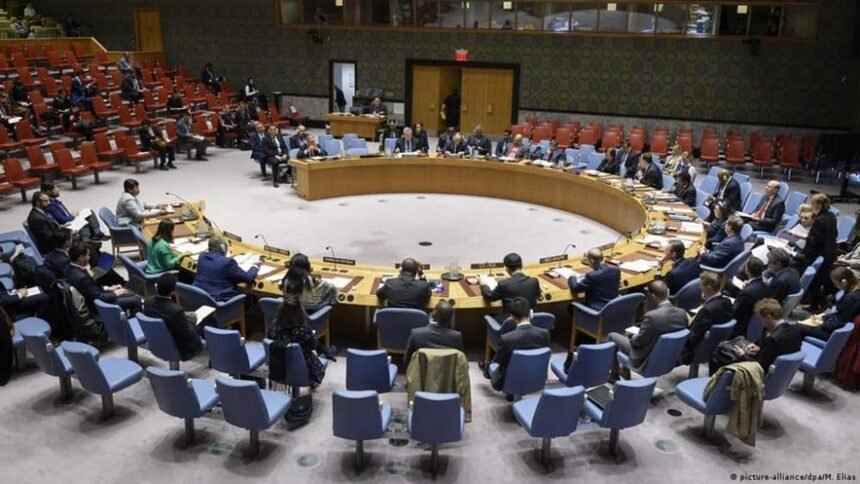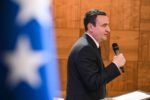The foreign ministers of Kosovo and Serbia exchanged accusations against each other’s countries during Tuesday’s session of the United Nations Security Council, which discussed the semiannual report of the UN Secretary-General on the mission in Kosovo (UNMIK).
Acting Foreign Minister of Kosovo, Donika Gërvalla, and Serbian Foreign Minister, Marko Gjurić, also expressed opposing views regarding the findings presented by Milbert Dongjoon Shin, the UNMIK Deputy Special Representative, during the meeting.
During the session, the United States representative said that there were no threats to security in Kosovo and supported the closure of the UN mission in the country.
What the UNMIK Report Said
The UNMIK report, covering the period from March 16 to September 15, called on all competent institutions in Belgrade and Pristina to prosecute those responsible for the September 2023 Banjska attack, when an armed group of Serbs attacked the Kosovo Police, killing one officer.
Most of the suspects in Kosovo remain at large, and Belgrade—conducting a parallel investigation—has not filed charges against Milan Radoičić, the former vice-chairman of the Serb List, who publicly claimed responsibility for the attack.
The report also noted positive developments, such as the holding of local elections in a fair and democratic atmosphere, and two rounds of dialogue between Kosovo and Serbia in June and September in Brussels under EU mediation. However, neither meeting produced official results.
Shin reiterated UNMIK’s concerns about the closure of Serbian institutions in Serb-majority municipalities and urged Pristina to include all affected communities in decision-making.
He also mentioned upcoming measures effective November 1, which would prevent vehicles with foreign license plates from circulating without authorization and require anyone lacking Kosovo documents to apply for residence permits — a move that could cause administrative challenges for minorities.
Shin expressed concern about arrests over displays of “cultural, national, or religious symbols” and highlighted the need to balance freedom of expression with preventing hate speech and violence.
UNMIK also warned of pressures faced by civil society representatives and journalists, noting reports of attacks and threats against media independence.
Donika Gërvalla: “Serbia Is a Real Threat to the Region”
Kosovo’s Foreign Minister, Donika Gërvalla, criticized the UNMIK report as “biased and incomplete,” saying it lacked essential facts.
She emphasized that Kosovo had held free and fair elections and described it as “a true Western democracy in the Western Balkans”, with a strong commitment to NATO and the EU.
Gërvalla accused Serbia of posing “a real threat to the region”:
“Every day, we see a propaganda machine under the control of [Serbian President] Aleksandar Vučić, systematically poisoning Serbian society and preparing the public for aggression against our country.”
She reaffirmed Kosovo’s commitment to dialogue but insisted it must be “a genuine dialogue, not Vučić’s deception.”
“His strategy toward the EU is betrayal, and toward his neighbors — hybrid warfare, even to the point of paramilitary aggression.”
Gërvalla cited the Banjska attack as proof that Serbia was “ready for war”, calling Radoičić “Vučić’s right-hand man.”
“Vučić considers him an honored guest of his regime. This is impunity for murder and aggression. The international community must put pressure on the regime in Serbia. Without consequences, they will escalate further,” she concluded.
Serbia’s Position
Serbian Foreign Minister Marko Gjurić described the UNMIK report as “balanced and realistic,” but claimed that the human rights of Serbs in Kosovo are systematically deteriorating and that ethnically motivated incidents have increased.
“Since [Kosovo Prime Minister] Albin Kurti came to power, 37 incidents against members of the Serb community have been recorded. This systematic denial of rights is not only a Serbian tragedy but a moral failure to act.”
He accused Kurti’s government of promoting hatred and carrying out “silent ethnic cleansing.”
“The Kurti regime has closed 128 essential institutions in Serb-majority areas — including schools, hospitals, social welfare offices, and even the Red Cross office,” Gjurić said.
The Position of International Actors
The United States representative urged both Kosovo and Serbia to reduce tensions, refrain from escalating measures, and return to dialogue.
“There are no threats to Kosovo’s security. UNMIK remains a peacekeeping mission without peacekeepers. Over 81% of its budget funds staff salaries for work that should now be handled by other organizations. It is time to transfer these functions,” the U.S. representative stated.
The UNMIK mission, created in 1999 under Resolution 1244, has long faced calls—especially from the U.S. and several other Security Council members—for its closure, a move opposed by Russia and its allies.
The European Union’s representative, Stavros Lambrinidis, urged Serbia to prosecute those responsible for the Banjska attack, saying:
“Serbia has not taken sufficient steps in this direction.”
He expressed deep concern over the situation in northern Kosovo and called for both sides, in cooperation with EULEX, to refrain from unilateral or provocative actions that could escalate tensions.
Lambrinidis welcomed the October local elections in Kosovo and emphasized the importance of Kosovo Serbs participating in them.
“We call for a peaceful transfer of power in these Serb-majority municipalities,” he said.






